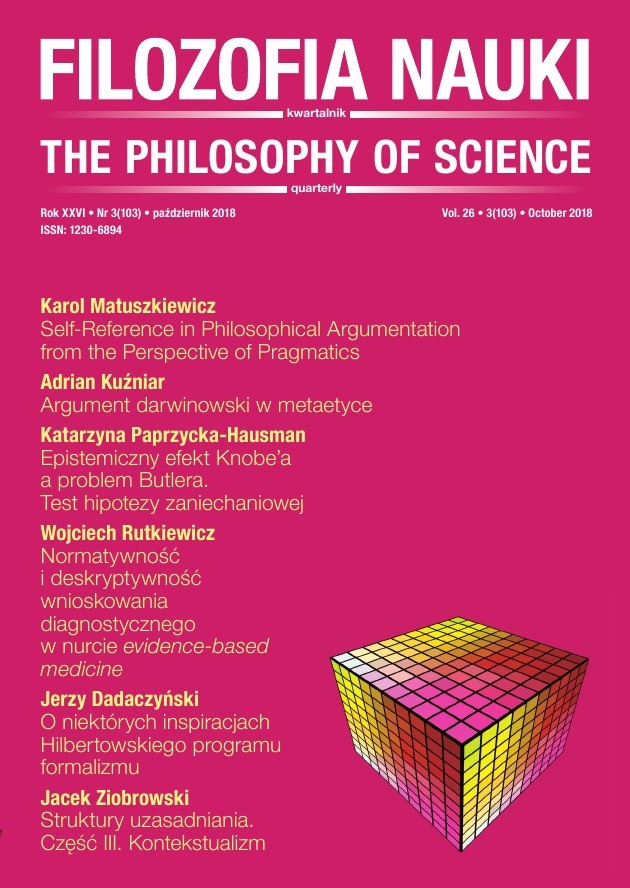Argument darwinowski w metaetyce
DOI:
https://doi.org/10.14394/filnau.2018.0016Słowa kluczowe:
natural selection, adaptive origin, moral knowledge, rationality of beliefs, naturalism, non-naturalism, expressivismAbstrakt
The Darwinian Argument in metaethics, as interpreted in this paper, aims to establish two theorems: (1) if our moral beliefs are effects of the mechanism of genetic or memetic natural selection,then they do not constitute knowledge; (2) if they are effects of the mechanism in question, they are not doxastically rational. The first part of the paper is devoted to the rational reconstruction of the argument thus understood. The second part analyzes the reconstructed argument and its significance from the vantage point of three major types of metaethical theories, i.e. naturalism, non-naturalism, and expressivism. It is argued that in principle naturalists and expressivists are in a position to refute the argument, but this is not true of non-naturalists.
Bibliografia
Dworkin R. (1996), Objectivity and Truth. You'd Better Believe It, "Philosophy and Public Affairs" 25(2), 87-139.
https://doi.org/10.1111/j.1088-4963.1996.tb00036.x
Gibbard A. (2003), Thinking How to Live, Cambridge, MA: Harvard University Press.
Hare R. M. (1997), The Axel Hägerström Lectures. A Taxonomy of Ethical Theories [w:] Sorting Out Ethics, Oxford: Clarendon Press, 43-62.
Joyce R. (2006), The Evolution of Morality, Cambridge, MA: A Bradford Book — The MIT Press.
Kuźniar A. (2009), Język i wartości. Racjonalność akceptacji ekspresywizmu metaetycznego, Warszawa: Wydawnictwo Naukowe Semper.
Kuźniar A. (2011), Internalizm w wersjach de dicto i de re w kontekście sporu o kognitywizm metaetyczny, "Kwartalnik Filozoficzny" 39(4), 5-24.
Kuźniar A. (2016), A Critical Analysis of Peter Singer's Views on the Role of the Theory of Evolution in Moral Epistemology [w:] Uncovering Facts and Values. Studies in Contemporary Epistemology and Political Philosophy, A. Kuźniar, J. Odrowąż-Sypniewska (eds.), "Poznań Studies in the Philosophy of the Sciences and the Humanities" 107,
Kuźniar A. (2017), Konsekwencje wyjaśnień darwinowskich w metaetyce, Warszawa: Wydawnictwo Naukowe Semper.
de Lazari-Radek K., Singer P. (2014), The Point of View of the Universe. Sidgwick and Contemporary Ethics, Oxford: Oxford University Press. https://doi.org/10.1093/acprof:oso/9780199603695.001.0001
Lewis D. (1986), On the Plurality of Worlds, Oxford: Basil Blackwell.
McPherson T., Plunkett D. (2015), Deliberative Indispensability and Epistemic Justification [w:] Oxford Studies in Metaethics 10, R. Shafer-Landau (ed.), Oxford: Oxford University Press, 104-133.
Moore G. E. (1919), Zasady etyki, tłum. C. Znamierowski, Warszawa: M. Arcta.
Nozick R. (1981), Philosophical Explanations, Cambridge, MA: The Belknap Press of Harvard University Press.
Parfit D. (2011), On What Matters, t. 2, Oxford: Oxford University Press. https://doi.org/10.1093/acprof:osobl/9780199572816.001.0001 https://doi.org/10.1093/acprof:osobl/9780199572809.001.0001
Quine W. V. O. (1984), Review of Parsons C. "Mathematics in Philosophy", "Journal of Philosophy" 81(12), 783-794.
https://doi.org/10.5840/jphil198481124 https://doi.org/10.2307/2026033
Quine W. V. O. (2000), O tym, co istnieje [w:] Z punktu widzenia logiki. Dziewięć esejów logiczno-filozoficznych, tłum. B. Stanosz, Warszawa: Fundacja Aletheia, 29-47.
Rawls J. (2009), Teoria sprawiedliwości, tłum. M. Panufnik, J. Pasek, A. Romaniuk, S. Szymański, Warszawa: Wydawnictwo Naukowe PWN.
Schechter J. (2017), Difficult Cases and the Epistemic Justification of Moral Belief [w:] Oxford Studies in Metaethics 12, R. Shafer-Landau (ed.), Oxford: Oxford University Press, 27-50.
Searle J. R. (1985), Intentionality. An Essay in the Philosophy of Mind, Cambridge: Cambridge University Press.
Shafer-Landau R. (2012), Evolutionary Debunking, Moral Realism and Moral Knowledge, "Journal of Ethics & Social Philosophy" 7(1), 1-37. https://doi.org/10.26556/jesp.v7i1.68
Singer P. (2005), Ethics and Intuitions, "The Journal of Ethics" 9(3/4), 331-352. https://doi.org/10.1007/s10892-005-3508-y
Street S. (2006), A Darwinian Dilemma for Realist Theories of Value, "Philosophical Studies" 127(1), 109-166.
https://doi.org/10.1007/s11098-005-1726-6
Street S. (2011), Mind-Independence without the Mystery. Why Quasi-realists Can't Have It Both Ways [w:] Oxford Studies in Metaethics 6, R. Shafer-Landau (ed.), Oxford: Oxford University Press, 1-32.
Street S. (2016), Objectivity and Truth. You'd Better Rethink It [w:] Oxford Studies in Metaethics 11, R. Shafer-Landau (ed.), Oxford: Oxford University Press, 293-333.
Sturgeon N. L. (2006), Moral Explanations [w:] Arguing about Metaethics, A. Fisher, S. Kirchin (eds.), London: Routledge, 117-144.
Wilson E. O. (2000), Socjobiologia, tłum. M. Siemiński, Poznań: Wydawnictwo Zysk i S-ka.



















 Filozofia Nauki | ISSN 1230-6894 | e-ISSN 2657-5868
Filozofia Nauki | ISSN 1230-6894 | e-ISSN 2657-5868